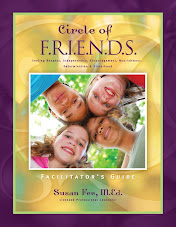
Ask almost any girl to name her best friend and she’ll launch into a complex rating system describing her “best friend, best-best friend, best friend that she’s currently not speaking to, best friend at school, best friend on the bus, used-to-be best friend,” and so on. In other words, it’s complex!
For girls, friends are everything and we do them a great disservice by not telling them the truth about relationships. Myth-buster #1: You can't have 80 best friends! The problem is, they don't have the language to properly distinguish all the people they know, and therefore, the criteria they choose to allow someone into their inner circle. The result? Poor choices, hurt feelings, and drama.
I developed the Friendship Bull's-eye Discussion Tool to help girls grasp the issue. The discussion questions (on the back of the product) prompt girls to think critically about their relationships choices online and in person. The bull's-eye also suggest that people flow in and out of your life for various reasons, and that's not always a bad thing.
Moms, share your story with your daughters. If you're like me, you're lucky to have 1-3 people who've made it to your inner circle and remain there today. Let's take the pressure off girls to be "friends" with everyone.







